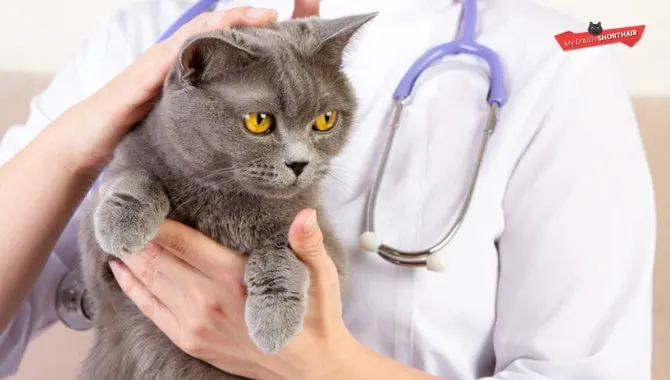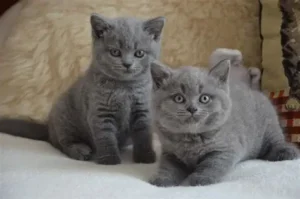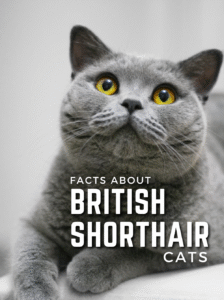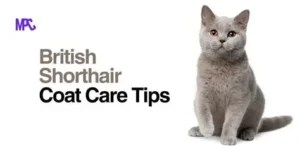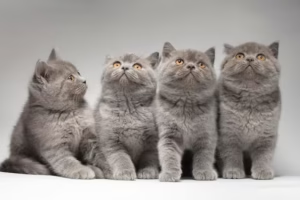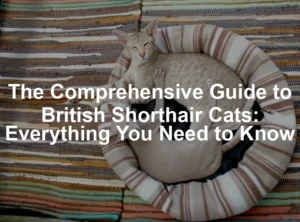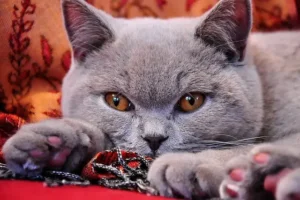What Are Common Health Issues in British Shorthair Cats?
British Shorthair cat health are generally known for their robust health and longevity. However, like all breeds, they are prone to certain health issues that owners should be aware of. Some common health problems in British Shorthair cat care tips include:
- Hypertrophic Cardiomyopathy (HCM): A heart condition that causes thickening of the heart muscles. This is a hereditary condition in some British Shorthairs, so regular checkups with a veterinarian are essential to detect it early.
- Obesity: British Shorthairs are known for their stocky build and muscular body, but this can sometimes lead to obesity if they are overfed or not given enough exercise. Obesity can lead to other health issues like diabetes and joint problems.
- Dental Issues: Like many cats, British Shorthairs are prone to dental disease. Regular dental care, including brushing their teeth and providing dental treats, can help prevent tooth decay and gum disease.
- Joint Problems: Due to their heavy build, British Shorthairs can develop joint problems, particularly in their hips and knees. Regular vet visits and weight management can help minimize the risk of joint issues.
- Kidney Disease: While less common, some British Shorthairs may develop kidney problems as they age. Regular monitoring of kidney function through blood tests is important for early detection.
How to Groom a British Shorthair Cat?
One of the main reasons British Shorthair cats are so loved is their easy-to-care-for coat. Despite their dense, plush fur, they require relatively minimal grooming compared to long-haired breeds. Here’s a basic guide to grooming your British Shorthair:
- Brushing: While their short coat doesn’t mat easily, British Shorthairs still benefit from regular brushing. Brush your cat at least once a week to remove loose fur and reduce shedding. This will also help keep their coat shiny and healthy.
- Nail Trimming: Trim your cat’s nails every couple of weeks to prevent them from becoming overgrown. This is particularly important for indoor cats, as their claws don’t naturally wear down as they would outdoors.
- Ear Cleaning: Check your British Shorthair’s ears regularly for signs of wax buildup, dirt, or infection. Gently clean their ears using a pet-safe ear cleaner.
- Bathing: British Shorthairs generally don’t need frequent baths. However, occasional bathing (every 4–6 months) can help maintain their coat and remove dirt or oils. Be sure to use a cat-friendly shampoo.
Do British Shorthair Cats Shed a Lot?
how to care for a British Shorthair cat? are moderate shedders, but they do shed more during seasonal changes, particularly in the spring and fall. Their short, dense coat doesn’t require extensive grooming, but regular brushing helps manage shedding and minimizes hairballs. If you’re sensitive to cat fur, brushing your British Shorthair a couple of times a week can keep shedding under control.
During the shedding season, you may notice more fur around the house, but this is entirely normal. You can also reduce shedding by feeding your cat a high-quality diet that supports healthy skin and coat.
How Often Should I Bathe My British Shorthair?
common health issues in British Shorthair cats don’t require frequent baths, but occasional bathing can be beneficial. Most owners bathe their British Shorthair every 4-6 months, or as needed. Since their short coat doesn’t trap dirt and oil, they don’t require regular baths like some other breeds.
British Shorthair cat care for beginners should be a calm and positive experience for your cat, so it’s essential to use a cat-friendly, mild shampoo and ensure that the water temperature is comfortable. Brushing your cat beforehand will also help to minimize the mess in the water and reduce stress for both you and your feline friend. veterinary care for British Shorthair cats
How to Take Care of British Shorthair Kitten Eyes?
British Shorthair cat obesity preventions, like all kittens, are incredibly adorable, but their eyes require some special care. Here are a few tips to keep your kitten’s eyes healthy: British Shorthair cat health
- Cleaning: Occasionally, you may notice discharge or crust around your kitten’s eyes. Gently wipe away any discharge using a clean, damp cloth. Be careful not to irritate their eyes.
- Monitor for Infections: If you notice your kitten’s eyes are red, swollen, or watering excessively, it could be a sign of an infection. Schedule a visit to the vet if you suspect any eye issues. British Shorthair cat health
- Regular Checkups: Ensure that your British Shorthair kitten’s eyes are examined by a vet during routine checkups. Some kittens may have congenital issues, but these are usually detectable early on.
Is It Normal for British Shorthair Cats to Be Overweight?
dental care for British Shorthair cats muscular build, British Shorthairs can sometimes appear overweight even when they are healthy. However, obesity is a concern, as it can lead to numerous health problems, including diabetes, joint issues, and heart disease.
To keep your British Shorthair at a healthy weight, follow these guidelines:
- Portion Control: Feed your cat a balanced diet with appropriate portion sizes. Measure their food to avoid overfeeding.
- Exercise: Encourage your British Shorthair to play and stay active. While they are not as energetic as some breeds, they still enjoy interactive play sessions. British Shorthair cat weight management
- Regular Vet Visits: Your vet can help monitor your cat’s weight and give you advice on how to maintain a healthy diet for them. British Shorthair kitten care
What Is the Best Diet for a British Shorthair Cat?
British Shorthair cat health are prone to obesity, so feeding them a balanced diet is key to maintaining a healthy weight. Here’s what to look for when choosing a food:
- High-Quality Protein: Look for foods that contain real meat (chicken, turkey, or fish) as the primary ingredient. British Shorthairs benefit from a protein-rich diet to support their muscular build. British Shorthair cat grooming routine
- Moderate Fat Content: British Shorthairs don’t need a high-fat diet, but they do require a moderate amount of healthy fats for energy. Avoid foods with excessive amounts of fat, as this can lead to weight gain.
- Omega Fatty Acids: Look for food that contains omega-3 and omega-6 fatty acids to promote a healthy coat and skin.
- Fiber: A small amount of fiber is important for digestive health and can help manage their weight.
How Do I Keep My British Shorthair Cat Healthy and Active?
British Shorthair cats are low-maintenance in terms of exercise, but they still need mental and physical stimulation to stay healthy. Here’s how you can help:
- Interactive Play: While they may not be as energetic as some breeds, British Shorthairs enjoy interactive play. Use toys like feather wands or laser pointers to keep them active.
- Climbing Trees and Scratching Posts: Provide your cat with cat trees or scratching posts to climb and scratch. This will help with both physical and mental stimulation.
- Regular Vet Checkups: Regular visits to the vet are essential for monitoring your British Shorthair’s health and activity levels.
Do British Shorthair Cats Need a Lot of Exercise?
British Shorthairs are not known for being particularly active or energetic, but they still require moderate exercise to stay healthy. While they don’t need as much exercise as some other breeds, they should still be encouraged to play and move around.
Here are a few ways to get your British Shorthair moving:
- Playtime: Engage your cat in short play sessions each day to keep them mentally stimulated and physically active.
- Provide Space: Even though British Shorthairs are not as energetic, they still enjoy having space to explore and move around. Ensure they have access to various surfaces like shelves, cat trees, and even windowsills to watch the outside world.
gatobritánicofarm.com
- British Shorthair health tips in New York
- Best diet for British Shorthair cats in Texas
- British Shorthair grooming services in Laurel
- Find British Shorthair breeders in USA
- Healthy British Shorthair cats for adoption in [Location]
AEO (Audience-Specific) Keywords:
- How to prevent obesity in British Shorthair cats
- Best grooming routine for British Shorthairs
- Healthy diet tips for British Shorthair kittens
- How to manage shedding in British Shorthair cats
- Keeping British Shorthair cats active and healthy
- What to do if your British Shorthair cat is overweight
- **How to groom your British Shorth
